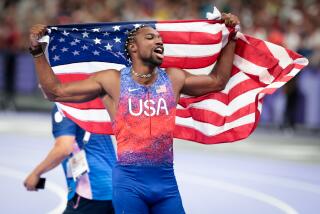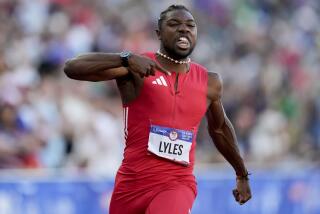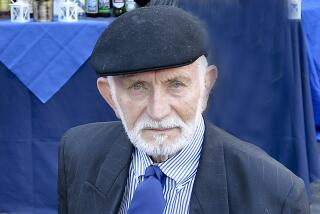Borzov Proves Himself Twice
- Share via
A product of science and sport, Valery Borzov was almost robotic in his precision.
A long jumper who switched to sprinting at the relatively advanced age of 17, Borzov was a graduate of the Kiev Institute of Physical Culture. Working there with a team of mathematicians and scientists, he studied films of great sprinters from the past as well as his contemporaries, analyzing techniques for getting out of the blocks quickly or the best angle at which to incline his body.
His attention to detail paid off at Munich, where he won the 100 and 200 on Sept. 1 and Sept. 4, respectively. He became the first Soviet runner to win a gold medal in a race under 5,000 meters and the first sprinter from any nation to win the sprint double since 1956, when Bobby Morrow of the U.S. did it.
In a story headlined, “The Fastest Human is a Commie,” Pulitzer Prize-winning New York Times columnist Red Smith wrote after the 100, “When the race was over, not one tan hair in the winner’s wavy coiffure was out of place. As befits a clean-cut citizen of the U.S.S.R., the coiffure was parted to the left.”
Smith called the race “mechanically perfect, and in no respect remarkable.”
But Borzov, 22, was no automaton. As Olympic historian David Wallechinsky noted in his 1984 edition of “The Complete Book of the Olympics,” Borzov had an introspective side.
“I very often have the following urge,” Wallechinsky quoted him as having said. “I suddenly feel on the street that I have to run. I absolutely have to run, dressed in a suit, wearing my hat and tie, not paying attention to the passers-by.... Then convention gets the upper hand and I restrain myself.”
He made it clear after the 100 that he was offended by observers who said his victory was tainted by the absence of U.S. sprinters Rey Robinson and Eddie Hart, who missed their second-round heats because U.S. coaches didn’t get updated schedule information.
And he had reason. Although Robinson and Hart had tied the world record of 9.95 seconds months earlier, Borzov was ranked first in the world in the 100 in 1971 and was the European champion in 1969 and 1971. According to some reports at the time, he, too, was unaware of his start time and was asleep in the stadium, awakened only when his heat was called.
“I beat the men who were there,” said Borzov, who took the lead after about 30 meters and had a big enough lead over Robert Taylor--a third American who had almost missed his heat--to ease up at the finish. He won in 10.14, ahead of Taylor (10.24) and Lennox Miller of Jamaica (10.33).
Borzov also held the European title in the 200, and he added the Olympic title to that by passing Larry Black of the U.S. in the last 65 meters to win in 20.0. Bitter about his treatment after the 100, he refused to be interviewed after the 200. He also won a silver medal in the 400 relay.
Four years later, at Montreal, he won a bronze in the 100--with the same time that had won him gold four years earlier--and bronze in the 400 relay. He attempted a comeback for the 1980 Moscow Games but ankle injuries slowed him.
Borzov has been married since 1977 to gymnast Lyudmila Tourischeva, who won three gold medals, two silver and three bronze at the 1972 and 1976 Games.
Borzov was the first president of Ukraine’s national Olympic Committee, formed in 1991 after the breakup of the old Soviet Union, and is Ukraine’s minister of youth and sports. He is also president of Ukraine’s athletics federation and since 1994 has been a member of the International Olympic Committee, for whom he serves on the Commission for Culture and Olympic Education.
More to Read
Go beyond the scoreboard
Get the latest on L.A.'s teams in the daily Sports Report newsletter.
You may occasionally receive promotional content from the Los Angeles Times.







